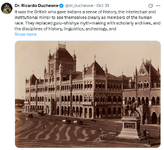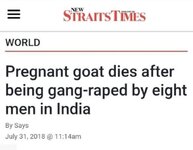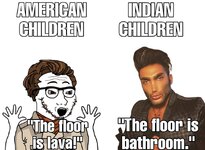A small price to pay to achieve DIE.
You are using an out of date browser. It may not display this or other websites correctly.
You should upgrade or use an alternative browser.
You should upgrade or use an alternative browser.
India - Culture, Politics and Insanity
- Thread starter Cynllo
- Start date
Indians are bioweapons.
Daily reminder, you do not hate Indians enough
In India you'll always hear all the dirt poor unwashed masses are rightfully suffering from Karma, which is the degradation you experience when you're reincarnated, not the false 'what goes around comes around' notion westerners have, Karma strikes in the next life. Therefore no reason to try to help them, they deserve their lot in life.
I've been adding organic Indian psyllium to my protein shakes for years, without any gastrointestinal issues, do they process/sterilize it in hi temp, no idea, but I numb my brain when I mix it in.
I've been adding organic Indian psyllium to my protein shakes for years, without any gastrointestinal issues, do they process/sterilize it in hi temp, no idea, but I numb my brain when I mix it in.
Accurate
Conservative nons who eschew “identity politics” reveal their true selves with the slightest provocation.
Get that? The future of America belongs not to whites, but to Indians. According to Dinesh.
Update:
Get that? The future of America belongs not to whites, but to Indians. According to Dinesh.
Update:
Most people can’t even begin to understand how insane this is. Far, far worse than Vivek’s meltdown at Christmas. Dinesh has spent literal decades pretending to be raceblind, and railing against identity politics.Then, when H-1B immigration starts to receive even the smallest pushback, he goes out of his way, under no pressure, literally 0, none, not even someone replying to him or talking about politics, to find a random YouTuber who is documenting something unsavoury about india, and brag that America and her future “belongs” to indians like him. He saw some people insulting indians, and he immediately dropped the mask he had maintained for decades, became an outright ethnonationalist, and started bragging that he and his coethnics will take over America.Dinesh is incredibly prominent, and has spent FOUR DECADES working his way into American politics. For 40 years he has been telling Americans to abandon identity politics. And the whole time he was just a closeted indian ethnonationalist, disguising his true beliefs. How many more foreign-born political commentators think exactly like him? How many political commentators who are born to immigrant parents think exactly like him?Dinesh D’Souza is literally an indian ethnonationalist who is insulting White Americans and bragging that indians will take over the USA. This should be 10x more disqualifying than even Vivek’s worst moments.
Last edited:
And heres the justification of the importance of eating cow dung and keeping cow dung on your porch
I knew a group of Indian college boys who were in China to get their medical degrees because they were lower caste and not allowed into the affordable state medical schools in India. They were from upper middle class families and obviously very well-mannered kids who found that medicine school in China was cheaper than private medical colleges in India they for which their caste was eligible.
They told me something similar to what the young man in this video is saying, that their parents wiped their asses directly with their left hands and refused to use toilet paper, but these boys, born in the mid-1990's, used toilet paper and did not understand their parents' reasons, however they would of course never disrespect them or the fact that they placed some kind of value on contact with both human and animal feces, which is part of Satanic/demonic worship around the world.
These boys who reject fetishization of feces are the cream of the crop Indians that most of us know in the West, regardless of their caste, but they are not normal Indians who would never make the kind of admission we see in this clip with Hermes. The proper hygiene of modernity has found some of these younger Indians receptive, but they are the exception.
The more I learn about India, the more impressed I am with the British colonization of it and how very little the locals have to complain about those hundreds of years of being uplifted from their obsession with manure, cannibalism, burning widows alive, etc.
^Cannibalism in India? Wasn't aware of that.
Didn't realize there is straight up caste discrimination in the Indian university system, you would think that given their numbers, the lower castes could get that voted out of existence?
Did the parents use a bidet instead of toilet paper?
Didn't realize there is straight up caste discrimination in the Indian university system, you would think that given their numbers, the lower castes could get that voted out of existence?
Did the parents use a bidet instead of toilet paper?
The Guardian: Reza Aslan outrages Hindus by eating human brains in CNN documentary^Cannibalism in India? Wasn't aware of that.
In 2017, he ate brains on camera with the noble savages, a local sect called the Agori.
Pretty much every culture that European Christians have encountered practiced cannibalism, which is one of the main reasons why those cultures were viewed as inferior and in need of change, especially the Amerindians and Mezo-Americans, as well as the sub-Saharans, who also practiced ritual sacrifice in large numbers.
That's what these five boys told me, that caste exclusion was normal, which was a surprise since my public school social studies classes had all framed this as something that had ended in ancient times, while those mean British colonizers had misunderstood the noble savages. Since then I've confirmed many times about the continued existence of the caste system preventing lower castes from going to certain schools and getting certain jobs.Didn't realize there is straight up caste discrimination in the Indian university system, you would think that given their numbers, the lower castes could get that voted out of existence?
The boys approached me to practice their already excellent english while I was doing an exercise in the campus café with my Chinese students, who were all doctors. The Indian boys were friendly and charming, so we ended up talking quite a bit every week after my classes. Eventually, I asked them to confirm for me some things from two sources about Indian culture: (1) the low budget American film Outsourced (2006) and (2) the five hour BBC documentary, The Story of India.Did the parents use a bidet instead of toilet paper?
They offered to watch both videos with me and tell me what was true and what wasn't, and there was a scene from Outsourced that touched on the ass-wiping custom, leading to them explaining in some detail its truth and how their parents all obeyed this tradition of wiping bare-handed without exception (no bidet or rinsing of any kind, before, during, or after, therefore dirtier than most Arabs & Turks), and went on to confirm everything else shown in the film as authentic.
From my own experience, I've learned that shit and piss is blesséd in India, in its religions, which is also true for Satanism practiced in Christian countries because all of those religions are essentially the same.
The next week, we watched the entire BBC documentary together and they all cried seeing so many stories of their own history being shown to them with more clarity than they had every experienced before. I'm not exaggerating one bit when I say they cried a lot and were sometimes overwhelmed with emotion to the point of being speechless while watching and, when it was finished, they could only tell me it was true according to everything they knew but, when I asked specific questions, they were too overjoyed to go into any of the details and were just smiling broadly and wiping their tears.
Their epiphany while watching the documentary seemed like the ultimate high point of our association and I really couldn't imagine where to go from there, so that was the last time I hung out with them. Also, because of my twice-weekly visits to their shared room, which was very clean and fragrant, I had begun to have bits of contact with other Indians in their huge dorm building and was slowly realizing these boys were exceptional in their politeness and good physiognomy, and was growing tired of having to see, hear and smell their classmates.
Later I learned that Europeans have long been responsible for other cultures' stories being lifted out of the realm of myth and legend and systematizing it properly into a coherent timeline full of meaning and significance, ie. history.
It was the British who gave Indians a sense of history, the intellectual and institutional mirror to see themselves clearly as members of the human race. They replaced guru-shishya myth-making with scholarly archives, and the disciplines of history, linguistics, archeology, and geography to study their culture and history. They built them true universities.
Before the Brits arrived, India had no historiographical tradition based on proper archives, documentation and causal analysis. They had mytho-poetic chronicles where legend was confounded with fact.
Thanks to the British, Indians learned about archival preservation. The Imperial Records Department (1891), established by the English, as well as provincial record rooms, preserved millions of Mughal, Maratha historical documents.
Properly trained British scholars like H.H. Wilson, James Prinsep, and Max Müller deciphered inscriptions such as Ashokan edicts.
It was the British who gave them scholarly periodicals and peer review journals, such as Journal of the Asiatic Society.
As a result, after thousands of years, Indians learned to write their own history. The first historical books about India were written by Brits: Vincent Smith's Early History of India (1904). They trained Indians to write the first modern histories, such as R.C. Majumdar, Jadunath Sarkar, and K.A. Nilakanta Sastri.
The British built Indians the first true universities, away from Madrasas and monastic centers: Calcutta, Bombay, Madras (1857) where the first to offer BA/BSc degrees, with research in sciences and humanities. In 1912, Brits produced the first Indian PhD in science.
In total, by 1947, India inherited 5 modern universities from the British, in addition to many colleges.
By creating Archaeological Survey of India, 1861, Indians were able to discover the Indus Valley (1924), under John Marshall.
Two Indian archeologists trained by the British, Dayaram Sahni and R.D. Banerji, used British methods to excavate Harappa and Mohenjo-Daro.
The British standardized Indian dialects. William Jones (1786) connected Sanskrit–Greek–Latin, leading to birth of comparative philology.
Fort William College (1800) produced first Hindi/Urdu grammars.
The British standardized scripts: Nagari for Hindi, Perso-Arabic for Urdu, which enabled mass printing.
The Indian Civil Service exams (created by British, 1853) trained the very bureaucrats who dismantled the Raj.
I will post later refuting the claim that Britain "de-industrialized" India, showing they created foundations for modern India.
Image: Elphinstone College, built 1835.

The Chinese were better at keeping their own histories than the Indians, but only from the point of view of the emperor's commandments and their fulfilment, and not from a more cultural point of view that its population could relate to instead of some disjointed legends and fables that were actually disorienting because of inconsistencies.
Last edited:
This is pretty good, footage of a room full of panjeet Indian scammers as they get hacked in real time
It’s done, the documentary about the India cow dung festival. Hindus are freaking weird edit apparently the jeets have already mass reported it and it got taken down
Edit try this
Edit try this
The aftermath of the poop throwing festival
Too long didn’t watch: about a trillion panjeets went ahead and went insane to mass report Tyler Olivera to try to cancel him, disparage his non existent sister that she must be on onlyfans , along with his mom,
Basically Indians have a sick obsession with saying they will kill him like Charlie Kirk, that white women love Indian men, and are tribal, hateful, out of touch ethno nationalists
Further there’s about ten minutes looking at Dinesh D’Souza showing that he’s been posing as a colorblind conservative for 40 years when in reality he’s just another India first panjeet
Too long didn’t watch: about a trillion panjeets went ahead and went insane to mass report Tyler Olivera to try to cancel him, disparage his non existent sister that she must be on onlyfans , along with his mom,
Basically Indians have a sick obsession with saying they will kill him like Charlie Kirk, that white women love Indian men, and are tribal, hateful, out of touch ethno nationalists
Further there’s about ten minutes looking at Dinesh D’Souza showing that he’s been posing as a colorblind conservative for 40 years when in reality he’s just another India first panjeet
Last edited:
^
She's lucky (as dumb people often are) it was only one pajeet. If there was more of them, it would end badly.
She's lucky (as dumb people often are) it was only one pajeet. If there was more of them, it would end badly.


